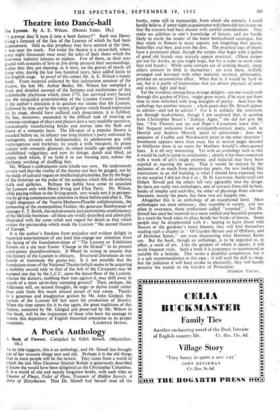A Poet's Anthology
As its title suggests, this is an anthology, and Dr. Sitwell has brought out of her treasure things new and old. Perhaps it is the old things that to most people will be the newest. They come from a world of which the late Miss Eleanour Sinclair Rohde is generously described I I know she would have been delighted) as the Christopher Columbus. It is a world of old and mostly forgotten books, with such titles as Theatre of Plants, Toilet of Flora, Treasurie of Hidden Secrets, A Boke of Distyllacion. That Dr. Sitwell had herself read all the books, some still in manuscript, from which she extracts, I could hardly believe, if some slight acquaintance with them did not assure me that the extracts had been chosen with careful consideration. They make no addition to one's knowledge of botany, and are hardly likely to excite the reader of the latest horticultural catalogue, but they relate to flowers in many aspects, not forgetting their guests, butterflies and bees, and even the dew. The practical uses of plants have a prominent place, though the recipes that begin with a gallon of good old brandy may scarcely appear practical. (These recipes are not for drinks, as you might hope, but for a water to wash your face and hands.) While some extracts are of striking beauty, many others amount to little in themselves ; yet even these, skilfully arranged and leavened with other material, mystical, philosophic, produce an accumulative effect. What that is, it would be hard to say, but it is partly of impressions that are almost physical, of scent and colour, light and heat.
Yet the wanderer among these strange delights—no one would rush through this garden of Flora—might grow weary, if he were not from time to time refreshed with long draughts of poetry. And here the anthology has another interest : which poets does Dr. Sitwell appear to admire—and not to admire ? For it is unlikely the omissions are through inadvertence, though I am surprised that, in quoting from Christopher Smart's "Jubilate Agno," she did not give the line, "For Flowers can see and Pope's Carnations knew him." Her frequent inclusions from seventeenth-century poets, such as Herrick and Andrew Marvell, point to admiration ; does her omission of Crabbe and Wordsworth point in the other direction ? Swinburne appears more than once, but in several pages devoted to fritillaries there is no room for Matthew Arnold's often-quoted lines. It is all very interesting. Yet with an anthology such as this it would be rash to jump to conclusions ; clearly it has been conceived with a work of art's single purpose, and material may have been rejected as marring the unity. That it would be marred by the inclusion of so much from present-day poets, the new looking like innovations in an old building, is what 1 should have expected, but to my surprise I did not find it so ; D. H. Lawrence, Sacheverell and Osbert Sitwell and the others fall very agreeably into the design. So there are really two anthologies, one of extracts from old herbals, books of simples and such-like, the other of gleanings from relevant literature, mostly the poets, but these two are happily one.
Altogether this is an anthology of an exceptional kind. Most anthologies are mere -mixtures ; they resemble in variety, and too often in sweetness, those confections called "assorted" ; but Dr. Sitwell has used her material to a more unified and beautiful purpose. In a word the book takes its place beside her books of poems. Some people may be disappointed with it ; hoping to learn about wild flowers or the gardener's latest blooms, they will find themselves reading such a chapter as " Of Garden Heroes and of CnIlants, and of Hortolan Saints," not even discovering what Hortolan Saints are. But the book, though an anthology, is to be regarded as, in effect, a work of art. Like the gardens of which it speaks, it will invite frequent visits. Such a book it is customary to recommend as suitable for a bedside. That seems a doubtful compliment, but it is a safe recommendation in this case ; it will send the dull to sleep, but the judicious it will keep awake so pleasantly, they will hardly perceive the transit to the Garden of Proserpine.
ANDREW YOUNG.


































 Previous page
Previous page